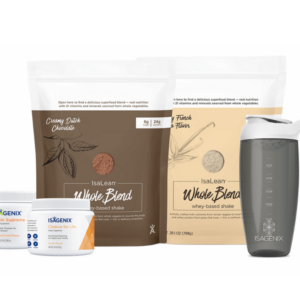
Probiotics vs. Antibiotics — What’s the Difference?
For decades, the suffix “-biotic” was most commonly associated with antibiotics, which are prescribed to fight bacterial infections in our bodies. If you’ve ever seen a doctor for bronchitis or a sinus infection, there’s a good chance they gave you antibiotics to fight the disease.
Antibiotics have saved millions of lives by fighting dangerous bacteria. But, what about probiotics? The name implies they’re the opposite of the lifesaving medication, but they’re actually bacteria themselves — good bacteria in your gut to improve your health.
We’ve been consuming probiotics for thousands of years, but science has only recently discovered just how amazing they can be for our bodies.
The Benefits of Probiotics
Your gut microbiome is home to billions of different bacteria. Many factors determine the health of this ecosystem, but the most important is your diet. In fact, the gut is often referred to as our second brain because its health is linked to our mood, focus, and cognitive function.
The best part? Some of the most probiotic-rich foods are also the most delicious!
- Yogurt.
- Sauerkraut.
- Tempeh.
- Kimchi.
- Miso.
- Kombucha.
- Pickles.
- Traditional buttermilk.
You might notice a pattern here: fermentation. Fermented foods and beverages are great breeding grounds for probiotic bacteria, but not all fermented foods and drinks are rich in probiotics.

Choosing the Right Probiotics
A probiotic is a probiotic, right? No! There are many types of probiotics, all with names that are difficult to pronounce, and they each have a different effect on your health, depending on your diet and lifestyle. What’s in your gut can make a difference in how probiotics function, too. So, how do you choose the right probiotics for you?
- Try different probiotic-rich foods to see which ones work best. Many of the foods listed above have health benefits in addition to healthy bacteria.
- Look for probiotic supplements that match your diet, such as conventional and vegetarian diet formulas.
- Check for a high colony-forming unit (CFU) count. This number tells you how many probiotics are in one serving. The higher the CFU count, the better.
- Make sure any probiotic supplements you take are backed by research. Not all of them are equal in quality.
- Don’t be afraid of a little trial and error. Probiotics are good for long-term health, and you might not notice the benefits immediately.
- Select a probiotic supplement that provides a wide range of microbial strains. Many foods or products only contain one or two, which isn’t nearly as effective. Research shows that microbial diversity is associated with improved health.
- Because probiotics are live bacteria cultures, it’s important to follow the storage and temperature directions on the label to ensure potency until the expiration date. Probiotics in refrigerated foods can be damaged in transit, so invest in a probiotic supplement formulated to withstand room temperature.
Products you might like
-
Sale!

Isagenix Everyday Health Pack
Original price was: $210.52.$157.89Current price is: $157.89. -
Sale!

Isagenix Total Health and Wellness: 4 Pillars of Health Pack
Original price was: $286.53.$214.90Current price is: $214.90. -
Sale!

Isagenix Shake and Ionix Supreme Bundle
Original price was: $154.65.$115.99Current price is: $115.99. -
Sale!

Isagenix Everyday Shake Pack
Original price was: $223.96.$167.97Current price is: $167.97.



